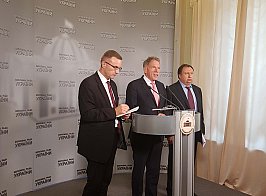Home >
All publications
International activity
27 January 2022, 15:11
 Members of the Committee on Ukraine's Integration into the EU met with
EU Commissioner for Neighbourhood and Enlargement Oliver Varhelyi,
during his visit to Ukraine. They thanked European partners for
supporting Ukraine amid military threats from Russia.
Members of the Committee on Ukraine's Integration into the EU met with
EU Commissioner for Neighbourhood and Enlargement Oliver Varhelyi,
during his visit to Ukraine. They thanked European partners for
supporting Ukraine amid military threats from Russia.
The Chair of the Committee thanked the partners for their support, in particular, for the decision of the European Commission to provide 1.2 billion in financial assistance to Ukraine: “This is very important because Ukraine has a lot of work inside the country”.
Ivanna Klympush-Tsintsadze stressed, that it was important for Ukraine that especially those who have undergone the path of transformation would be involved in the implementation of real reforms in Ukraine. The resilience of the state depends on strong and independent institutions and Ukraine must work on this. The Chair of the Committee also called on European partners to increase their activity and increase the number of high-ranking visits from the European Commission to Ukraine. Ivanna Klympush-Tsintsadze thanked the EU for its diplomatic efforts and support for Ukraine's threats. At the same time, she is convinced that it is time for Western partners to decide on the point of no return, after which painful sanctions against Russia should be imposed: “We still do not understand where the boiling point after which the Allies will adopt sanctions. Because it's not just about tanks that can come to Ukraine from Russia or Belarus, it's not just about possible bombing or artillery shelling of our land. The point is to prevent our territory and our sovereignty from being torn off piece by piece”. The Chair of the Committee is convinced that Russia may use subversive activities inside Ukraine: “We have already heard from some Russian high-ranking officials that if Russia is disconnected from SWIFT, a civil war will break out in Ukraine. And this proves once again that Russia is behind the provocations of civil unrest in 2014 and through its allies, Russia will try to organize the same actions in Ukraine again. All this should be seriously considered and discussed to make sure that such tactics are not allowed”.
The Chair of the committee noted that due to the war waged by Russia, Ukraine lost 7% of its territory, 20% of its economy and 15,000 lives of its citizens. Millions of people have been forced to flee their homes. Nevertheless, Ukraine has remained resilient and has done its best not to create a migration crisis for European partners: “Therefore, we must be strong, strengthen our internal resilience and resist the hybrid attacks, psychological pressure and subversive activities that Russia is resorting to. Because this hybrid war is not only against Ukraine. It is against the whole West. And our Western partners seem to have become much soberer in their assessment of Russia's true intentions and appetites”.
Ivanna Klympush-Tsintsadze: “We made our European choice in 2014 and continue to pay the highest price for it”

The Chair of the Committee thanked the partners for their support, in particular, for the decision of the European Commission to provide 1.2 billion in financial assistance to Ukraine: “This is very important because Ukraine has a lot of work inside the country”.
Ivanna Klympush-Tsintsadze stressed, that it was important for Ukraine that especially those who have undergone the path of transformation would be involved in the implementation of real reforms in Ukraine. The resilience of the state depends on strong and independent institutions and Ukraine must work on this. The Chair of the Committee also called on European partners to increase their activity and increase the number of high-ranking visits from the European Commission to Ukraine. Ivanna Klympush-Tsintsadze thanked the EU for its diplomatic efforts and support for Ukraine's threats. At the same time, she is convinced that it is time for Western partners to decide on the point of no return, after which painful sanctions against Russia should be imposed: “We still do not understand where the boiling point after which the Allies will adopt sanctions. Because it's not just about tanks that can come to Ukraine from Russia or Belarus, it's not just about possible bombing or artillery shelling of our land. The point is to prevent our territory and our sovereignty from being torn off piece by piece”. The Chair of the Committee is convinced that Russia may use subversive activities inside Ukraine: “We have already heard from some Russian high-ranking officials that if Russia is disconnected from SWIFT, a civil war will break out in Ukraine. And this proves once again that Russia is behind the provocations of civil unrest in 2014 and through its allies, Russia will try to organize the same actions in Ukraine again. All this should be seriously considered and discussed to make sure that such tactics are not allowed”.
The Chair of the committee noted that due to the war waged by Russia, Ukraine lost 7% of its territory, 20% of its economy and 15,000 lives of its citizens. Millions of people have been forced to flee their homes. Nevertheless, Ukraine has remained resilient and has done its best not to create a migration crisis for European partners: “Therefore, we must be strong, strengthen our internal resilience and resist the hybrid attacks, psychological pressure and subversive activities that Russia is resorting to. Because this hybrid war is not only against Ukraine. It is against the whole West. And our Western partners seem to have become much soberer in their assessment of Russia's true intentions and appetites”.

